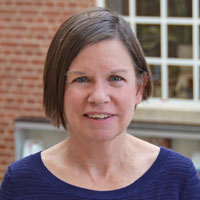UNC’s pediatric airway center continues to improve care for children with tracheostomies, study finds
January 19, 2016
Pediatric patients who have complex respiratory problems, especially children with tracheostomies, face serious challenges in the health care system. Often, they are treated by several specialists, and poor communication among providers can increase the chance that their care will be less than optimal.
In an article published online Jan. 11 in the journal Pediatrics, UNC Gillings School of Global Public Health alumna Kathleen Abode, BSN, MPH, describes how the North Carolina Children’s Airway Center has tackled many of the challenges to good care by decreasing and optimizing hospitalization, improving communication among providers and avoiding tracheostomy complications by using an interdisciplinary team to initiate targeted improvements in care.
UNC’s Airway Center was established at UNC Children’s Hospital in 2007 to provide an organizational framework for efficient outpatient multidisciplinary care, existing as a “virtual clinic.” Patients move between hospital-based specialty clinics for same-day appointments with designated physicians, while the center’s nonphysician staff meets with patients and caregivers between physician appointments.
The current study tracks the implementation and outcomes of improvement initiatives from the clinic’s inception until 2013. Researchers reviewed records of 1,273 children from birth to age 21 years who had been served over the six-year period.
The proportion of patients with tracheostomies increased from 42 percent in 2007 to 64 percent in 2013. Researchers had three aims – to optimize length of hospital stay for children with newly placed tracheostomies, to improve communication among providers and caregivers, and to avoid tracheostomy complications.
The barriers to timely hospital discharge included lack of teaching tools and staff members to provide training to the children’s caregivers and delay in requesting appropriate medical supply requests for use outside the hospital. To address these challenges, the center enhanced educational strategies, including providing written and audiovisual materials in both English and Spanish, training a wider group of medical personnel who could teach parents and other caregivers, and initiating care planning at the time the decision was made to proceed with tracheostomy. The mean length of hospital stay for tracheostomy patients under one year of age decreased from 37 days in 2007 to 26 days in 2013.
To streamline decision-making and avoid treatment delays associated with separate evaluations by multiple providers, center leaders increased the number and efficiency of conferences that included multiple providers, up from 39 weekly conferences in 2008 to 47 in 2013, each meeting focusing on the needs of about 24 patients.
At the point of decannulation, or removal of the tracheostomy tube when it is no longer needed, the likelihood of complications rises significantly. By adhering to strict protocol, the likelihood of successful decannulation rose from 68 percent to 86 percent during the six years of the study.
In conclusion, the authors note that the primary value of programs such as the N.C. Children’s Airway Center is the opportunity to enhance thoughtful decision-making among caregivers and the medical community.
“Because airway centers are inherently complex systems, it may be difficult to develop standardized performance measures and assess outcomes across patient, team and organizational domains,” they write. “Organizations developing multidisciplinary children’s airway centers should adapt structure, processes and goals to individual institutional strengths, barriers and resources.”
Abode, who earned a Master of Public Health degree in the Gillings School’s Public Health Leadership Program, is adjunct assistant professor of pediatrics in the UNC School of Medicine. She has served as clinical program director of the N.C. Children’s Airway Center since 2007.

